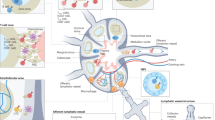Abstract
This paper highlights degeneracy as being an important property in both the immune system and biology in general. From this, degeneracy is chosen as a candidate to inspire artificial immune systems. As a first step in exploiting the power of degeneracy, we follow the conceptual framework approach and build an abstract computational model in order to understand the properties of degenerate detectors free of any application bias. The model we build is based on the activation of TH cell in the lymph node, as lymph nodes are the sites in the body where the adaptive immune response to foreign antigen in the lymph are activated. The model contains APC, antigen and TH cell agents that move and interact in a 2-dimensional cellular space. The TH cell agent receptors are assumed to be degenerate and their response to different antigen agents is measured. Initial observations and results of our model are presented and highlight some of the possibilities of degenerate detector recognition.
Preview
Unable to display preview. Download preview PDF.
Similar content being viewed by others
References
Andrews, P.S., Timmis, J.: Inspiration for the Next Generation of Artificial Immune Systems. In: Jacob, C., Pilat, M.L., Bentley, P.J., Timmis, J.I. (eds.) ICARIS 2005. LNCS, vol. 3627, pp. 126–138. Springer, Heidelberg (2005)
Hart, E., Timmis, J.: Application Areas of AIS: The Past, The Present and The Future. In: Jacob, C., Pilat, M.L., Bentley, P.J., Timmis, J.I. (eds.) ICARIS 2005. LNCS, vol. 3627, pp. 483–497. Springer, Heidelberg (2005)
Cohen, I.R.: Discrimination and dialogue in the immune system. Seminars in Immunology 12, 215–219 (2000)
Cohen, I.R.: Tending Adam’s Garden: Evolving the Cognitive Immune Self. Elsevier Academic Press, Amsterdam (2000)
Cohen, I.R.: The creation of immune specificity. In: Segal, L.A., Cohen, I.R. (eds.) Design Principles for Immune Systems and Other Distributed Autonomous Systems, pp. 151–159. Oxford University Press, Oxford (2001)
Cohen, I.R., Hershberg, U., Solomon, S.: Antigen-receptor degeneracy and immunological paradigms. Molecular Immunology 40, 993–996 (2004)
Stepney, S., Smith, R., Timmis, J., Tyrrell, A., Neal, M., Hone, A.: Conceptual frameworks for artificial immune systems. International Journal of Unconventional Computing 1 (2005)
Edelman, G.M., Gally, J.A.: Degeneracy and complexity in biological systems. Proceedings of the National Academy of Science (PNAS) 98, 13763–13768 (2001)
Parnes, O.: From interception to incorporation: Degeneracy and promiscuous recognition as precursors of a paradigm shift in immunology. Molecular Immunology 40, 985–991 (2004)
Burnet, F.M.: The Clonal Selection Theory of Acquired Immunity. Cambridge University Press, Cambridge (1959)
Sercarz, E.E., Maverakis, E.: Recognition and function in a degenerate immune system. Molecular Immunology 40, 1003–1008 (2004)
Tieri, P., Castellani, G.C., Remondini, D., Valensin, S., Loroni, J., Salvioli, S., Franceschi, C.: Capturing degeneracy of the immune system. In: Flower, D., Timmis, J. (eds.) Silico Immunology. Springer, Heidelberg (to appear, 2007)
Abbas, A.K., Lichtman, A.H.: Cellular and Molecular Immunology, 5th edn. Saunders, Philadelphia (2003)
Goldsby, R.A., Kindt, T.J., Osborne, B.A., Kuby, J.: Immunology, 5th edn. W. H. Freeman and Company, New York (2003)
Janeway, C.A., Travers, P., Walport, M., Shlomchik, M.: Immunobiology, 5th edn. Garland Publishing (2001)
Anderton, S.M., Wraith, D.C.: Selection and fine-tuning of the autoimmune t-cell repertoire. Nature Reviews Immunology 2, 487–498 (2002)
Maree, A.F.M., Panfilov, A.V., Hogeweg, P.: Migration and thermotaxis of Dictyostelium discoideum slugs, a model study. Journal of Theoretical Biology 199, 297–309 (1999)
Author information
Authors and Affiliations
Editor information
Editors and Affiliations
Rights and permissions
Copyright information
© 2006 Springer-Verlag Berlin Heidelberg
About this paper
Cite this paper
Andrews, P.S., Timmis, J. (2006). A Computational Model of Degeneracy in a Lymph Node. In: Bersini, H., Carneiro, J. (eds) Artificial Immune Systems. ICARIS 2006. Lecture Notes in Computer Science, vol 4163. Springer, Berlin, Heidelberg. https://doi.org/10.1007/11823940_13
Download citation
DOI: https://doi.org/10.1007/11823940_13
Publisher Name: Springer, Berlin, Heidelberg
Print ISBN: 978-3-540-37749-8
Online ISBN: 978-3-540-37751-1
eBook Packages: Computer ScienceComputer Science (R0)




